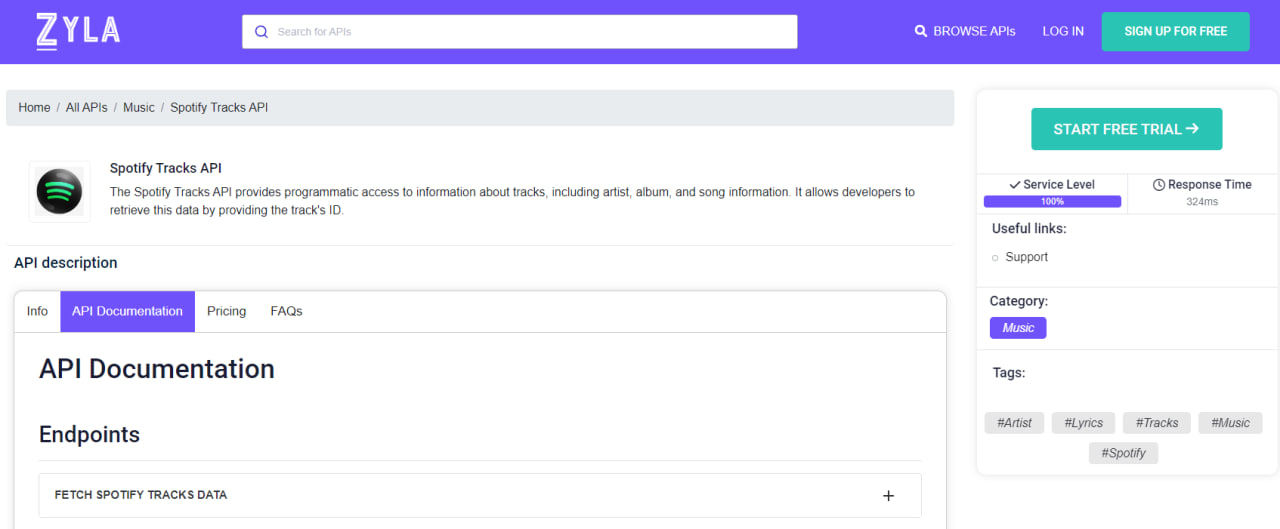In the digital age, music-sharing and recommendation platforms have become increasingly popular, enabling music enthusiasts to discover new artists, genres, and songs. One crucial aspect of these platforms is the ability to access comprehensive information about tracks, including lyrics and production details.
Thanks to APIs, developers now have a powerful tool at their disposal to extract song lyrics and delve into the production of albums. In this article, we will explore the capacity of one such API and discuss how you can leverage it to create your music recommendation application.
Introducing Spotify Tracks API
Spotify Tracks API provides developers with a wide range of functionalities to access detailed information about tracks available on the Spotify platform. With this API, you can extract metadata, audio features, lyrics, and more, enabling you to create immersive music experiences for your users. Below we’ll explore some of the features this API brings to the table.
Extracting Song Lyrics: One of the most significant features of the Spotify Tracks API is its ability to extract song lyrics. By making a simple API call, you can retrieve accurate and up-to-date lyrics for any track in Spotify’s vast music library. This opens up exciting possibilities for developers looking to build music-sharing and recommendation platforms, as lyrics play a crucial role in the user’s understanding and connection with a song. Whether you want to display lyrics directly alongside the track or use them to enhance the recommendation algorithm, the Spotify Tracks API has got you covered.
Unleashing the Power of Album Production Information: Beyond lyrics, the Spotify Tracks API allows you to access valuable information about the production of albums. By leveraging the API, you can retrieve details such as the album’s release date, label, producer, and collaborators. This information can be invaluable for creating music recommendation applications that offer a deeper understanding of an artist’s discography and the evolution of their sound over time. By incorporating album production data, you can enhance the user experience and provide insightful recommendations based on an artist’s creative journey.
Building Your Music Recommendation Application: Implementing the Spotify Tracks API into your music recommendation application is a straightforward process. Spotify provides comprehensive documentation and developer resources, including libraries and SDKs, to facilitate integration with various programming languages and frameworks. By combining the power of the Spotify Tracks API with other APIs, such as those for user authentication, playlist management, and audio analysis, you can create a robust and engaging platform that caters to music lovers’ needs.
How Does This API Work?
All the functionalities provided by Spotify Tracks API need a tracking ID to function. After this ID is provided, the API then delivers its response. One of the possible endpoints for Spotify Tracks API is “Fetch Spotify Tracks Data”, which allows developers to retrieve the data of a specific track on Spotify, along with information regarding the album it corresponds to. In the following example, the API was provided with the code for the song “I’ve Seen Footage” performed by the experimental hip-hop group Death Grips:
{
"tracks": [
{
"album": {
"album_type": "album",
"artists": [
{
"external_urls": {
"spotify": "https://open.spotify.com/artist/5RADpgYLOuS2ZxDq7ggYYH"
},
"id": "5RADpgYLOuS2ZxDq7ggYYH",
"name": "Death Grips",
"type": "artist",
"uri": "spotify:artist:5RADpgYLOuS2ZxDq7ggYYH"
}
],
"external_urls": {
"spotify": "https://open.spotify.com/album/1PQDjdBpHPikAodJqjzm6a"
},
"id": "1PQDjdBpHPikAodJqjzm6a",
"images": [
{
"height": 640,
"url": "https://i.scdn.co/image/ab67616d0000b273b4f8459b0f719f8a97ee1c8c",
"width": 640
},
{
"height": 300,
"url": "https://i.scdn.co/image/ab67616d00001e02b4f8459b0f719f8a97ee1c8c",
"width": 300
},
{
"height": 64,
"url": "https://i.scdn.co/image/ab67616d00004851b4f8459b0f719f8a97ee1c8c",
"width": 64
}
],
"is_playable": true,
"name": "The Money Store",
"release_date": "2012-04-23",
"release_date_precision": "day",
"total_tracks": 13,
"type": "album",
"uri": "spotify:album:1PQDjdBpHPikAodJqjzm6a"
},
"artists": [
{
"external_urls": {
"spotify": "https://open.spotify.com/artist/5RADpgYLOuS2ZxDq7ggYYH"
},
"id": "5RADpgYLOuS2ZxDq7ggYYH",
"name": "Death Grips",
"type": "artist",
"uri": "spotify:artist:5RADpgYLOuS2ZxDq7ggYYH"
}
],
"disc_number": 1,
"duration_ms": 202853,
"explicit": true,
"external_ids": {
"isrc": "USSM11200908"
},
"external_urls": {
"spotify": "https://open.spotify.com/track/7nCONy10IHp7XD3oYZ0lcx"
},
"id": "7nCONy10IHp7XD3oYZ0lcx",
"is_local": false,
"is_playable": true,
"name": "I've Seen Footage",
"popularity": 61,
"preview_url": "https://p.scdn.co/mp3-preview/8f1d8d7f75478c3dd750b87d85f326fae492153a?cid=d8a5ed958d274c2e8ee717e6a4b0971d",
"track_number": 6,
"type": "track",
"uri": "spotify:track:7nCONy10IHp7XD3oYZ0lcx"
}
]
}
How Can I Get This API?
By incorporating this API into your app or website, you can provide users with a unique and immersive music-sharing experience. Whether you want to display lyrics alongside tracks or offer detailed insights into an artist’s discography, Spotify Tracks API empowers developers to build dynamic and captivating platforms that resonate with music enthusiasts. So, take the plunge and try the Spotify Tracks API to create your music recommendation application today! You can do so by following these instructions:
1- Go to www.zylalabs.com and search for “Spotify Tracks API“, then click on the “Start Free Trial” button to start using the API.
2- Register and choose the plan that suits you best, you can cancel it whenever you want, even at the end of the free trial.
3- Once you find the endpoint you need, make the API call by clicking the “run” button and you will see the results on your screen. You can also choose the programming language of your choice and the response will be given in the friendly JSON format.






